Ramadan has started and all over the world people of Muslim faith fast for 30 days. In Indonesia, the country with the world´s largest Muslim population, around 200 Million people train themselves in self-control from dawn to dusk in these days. In Ramadan the daily life in Indonesia changes a lot and even Non-Muslims, expats or tourists can´t fail to notice this.
Many times, I have been asked by expats in Indonesia how Ramadan is like? What does it mean to Muslim Indonesians? And what will change in the social and public life? To give insights as well as orientation for expats in the country, I´m presenting today
FACTS, BACKGROUND INFORMATION AND TIPS FOR RAMADAN.
CULTURAL KNOWLEDGE INDONESIA SERIES
This is another article of the CULTURAL KNOWLEDGE INDONESIA SERIES. In this blog, I discuss regularly cultural concepts of Indonesia as well as cross-cultural situations between expats and Indonesians. Stay tuned!
Why fasting?
No matter if Christians, Buddhists or Muslims, the motivation for fasting in all religions is to train self-control. People practice to hold back their desire, to resist the temptation of human pleasures like food, smoking or sex in order to gain more personal strength and a deeper faith. By avoiding food and drinks during day time fasting people also show their empathy to all those who don´t have access to regular food or clean water in this world. More about the motivation for fasting in Ramadan is wonderfully explained this video.
How does it work?
Fasting people don´t eat, drink, smoke and have sex during daylight time, meaning from sunrise to sunset. Fasting starts every morning at Imsak (around 4.20am) before sunrise and ends at Maghrib (around 5.45pm) with buka puasa, the fast-breaking after sunset. In late afternoon, you might hear sirens from mosque loudspeakers that announce the time of fast-breaking. The last meal in the morning is called sahur for that people get up around 3.30am. Generally, almost all Muslims try to fast except of sick people, menstruating, pregnant and breastfeeding women as well as people who are traveling.
Food in public
Many food stalls keep close during daytime. Others are open but cover their windows to decrease temptation for those who fast. Be aware that your favorite Bubur Ayam vendor or Padang food restaurant might not operate as usual. I have also seen that in the beginning of Ramadan many food stalls are closed but return to normal opening hours after some days. What I want to say is: If you don´t fast, you need to find out where to buy food or where to eat, since the local culinary scene has changed for some time.
Many time I´ve been asked, “Should I eat or drink in front of fasting people?” Well, the answer is yes and no. Nobody forbids non-fasting people to eat or drink in public. Many say that seeing others eat even strengthens their will. However, I usually don´t drink when I wait in the crowds at the Supermarket´s cashier or while I walk around in public. I consider this as a sign of respect.
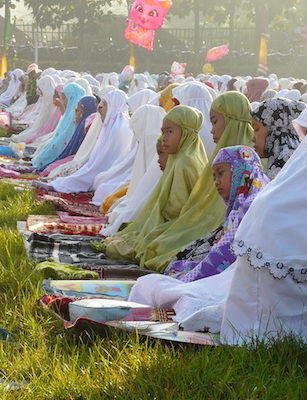
Nightlife
As my Indonesian husband was little, Ramadan was the best time of the year. Not only because there were so many extraordinary things going on, but also because he was allowed to stay up late. Also today, social life shifts partly to nighttime during Ramadan. People come together for buka puasa (see below) and prayer. Until late at night, they gather and chat while the children play around. Especially the area around a mosque is busy after sunset. Food for sahur is also prepared in the evening and people have this last meal before dawn when it is still dark outside. You might not believe it if you haven´t seen it, but in the darkness at 4am kampung streets are busy with people walking to the local mosque for Morning Prayer!
Buka puasa bersama
The fast breaking in late afternoon is a big event – everyday! And as the name buka puasa bersama (breaking the fast together) says, it is a social event. And “social” in Indonesia means that there are a lot of people involved. People do the buka bersama (sometimes also bukbar – buka bareng) either in the mosque or in the family but hardly alone. Beginning from mid of Ramadan, many companies, clubs, organizations, schools or Arisan* also organize their individual buka bersama events. If you get an invitation for that, don´t miss it! It´s a great chance to get a glimpse into Indonesian traditions, meet lots of people, and taste a big variety of yummy food.
*Arisan is a group of people that meets regularly for some reason.
Snack sales in the afternoon
Another chance to taste Indonesian traditional food is to buy snacks from the jajan (snack) vendors in the afternoon. Only in Ramadan, women from the nearby kampung sell sweet, stomach friendly drinks and a big variety of finger food on the sidewalks of the streets. Don´t be too late: Since they provide food for the fasting people, they close their sale once the buka puasa siren has shrilled!
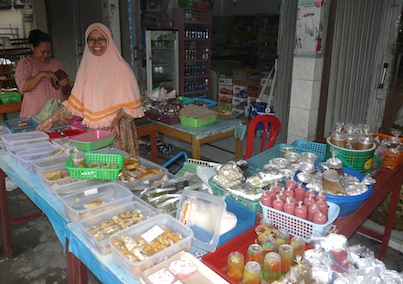
Ramadhan and business
The fasting month in general is a time when people try to slow down their pace of life, and this also counts for business. For many, Ramadhan is a time of introspection and consideration that demands working on tasks in a more thoughtful way. To point a finger on deadlines or push people to better performance is therefore not only counterproductive. It is also seen as inappropriate in the holy month. Full-day training events or workshops therefore should better be scheduled before or after Ramadhan. Also, in daily business, many office workers feel more comfortable to conduct meetings during morning hours. When you haven´t had food and drinks since 3.30 am in the morning, it can be quite challenging to be fit for important business talk after 12 o´clock.
The mass migration – pulang kampung
It starts around one week before Idul Fitri (the Eid Fest) and I´m sure it is one of the biggest mass migrations of today´s world: The pulang kampung (going home to the village) tradition. As the name says, people go home to the place where they come from to gather with the parents, siblings, grandma, great-grandpa, aunties, and third-degree cousins, short: the extended family. It is not important whether one was born in that village or in Jakarta, people go back to the kampung where the ancestors come from. Since tens of millions of people have moved from the villages to the big cities in the last decades, you can imagine how many will start the journey back. And how crowded the country´s roads, train stations, harbors and airports across the country will be…
My tip: Be prepared for this. If you plan to leave your city for the Eid holiday, get your tickets as soon as possible!
The Taqbiran parade
After the fast breaking on the last day of Ramadan there is the Taqbiran parade. People dress up and walk through the streets while singing religious songs to the rhythmic beat of drums. Some even pull vehicles with miniatures of mosques, straw camel puppets or other signs of Islam´s history along their track. People celebrate their victory over desire with everything that comes with that. It´s an exciting and colorful event to watch! But be careful: There is a lot of firework going on!
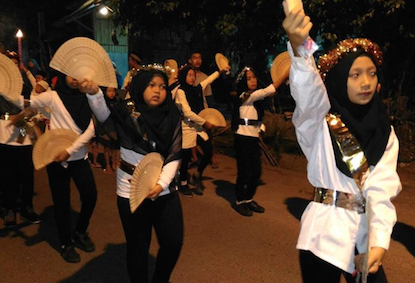
Idul Fitri
In the early morning of the first Lebaran (means Idul Fitri holiday) day people come together for the main Morning Prayer. And since the space of the mosques is far not enough to provide a place for everybody, the prayers are mostly conducted on public parking spaces, in the streets or on football fields. Expats are welcome to watch this event, but need to get up before 5am!
Social responsibility
If you work in an office, sooner or later you will come across the word THR during Ramadan. THR means Tunjangan Hari Raya and is something like an extra salary for employees. People await the THR payment because for many Idul Fitri is the time to buy new clothes or goods. Another tradition is Zakat: Everybody who runs a business donates a small percentage of the profit to charity. No matter how big your business is people believe that once you´ve made profit you have the responsibility to share with those who are less fortunate.
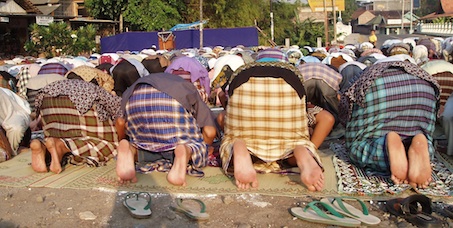
There are a lot of other Ramadan traditions throughout Indonesia that to mention would be beyond the scope of my article. How do you experience Ramadan in Indonesia? Let me know by leaving a comment below.
There is one more idea I would like to share with you:
Ramadan in Indonesia is a special time. Its atmosphere often reminds me of Advent season in Europe… Why? Just like in Advent, I feel that people take more care for each other and also for themselves. They practice in holding back anger, exercise patience and show empathy for those who are around. Families spend more time together and rushing through life in the name of business becomes secondary. Not to mention the religious music and the chains of lights at mosques or shopping centers that create the same cozy atmosphere like a Christmas tree…
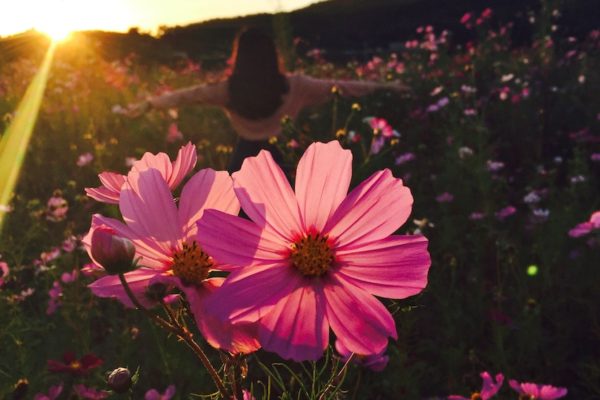
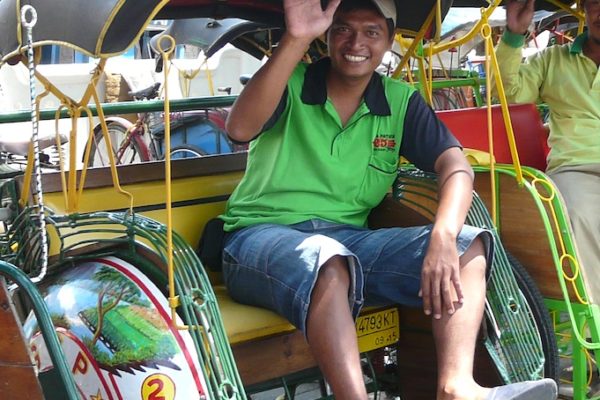
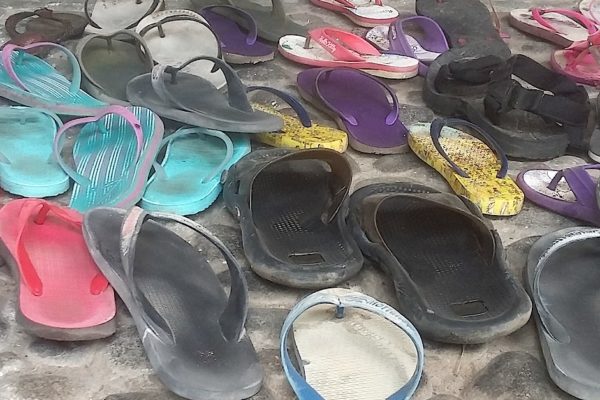
 Just
Just